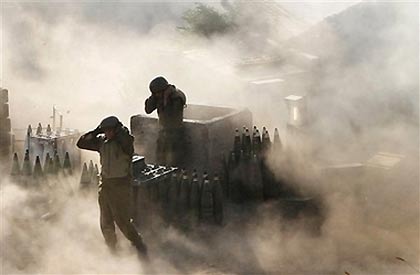Israel told the United Nations on Wednesday it held Lebanon to blame for the
capture of two of its soldiers by Hizbollah guerrillas, calling the act "a clear
declaration of war."
|

Lebanese
citizens inspect the damage to their house after an Israeli airstrike hit
a neighboring suspected Hezbollah guerrilla position, unseen, in the
village of Debbine, next to the southern town of Marjayoun, Lebanon,
Wednesday, July 12, 2006. Hezbollah fighters launched a raid into Israel
and captured two Israeli soldiers Wednesday, triggering an Israeli assault
with warplanes, gunboats and ground troops in southern Lebanon to hunt for
the captives. Seven Israeli soldiers, two Lebanese civilians and a
guerrilla were killed in the violence. [AP
Photo]
|
Israel's government authorised what it called a severe
response for the capture of the two soldiers and killed eight others
in cross-border attacks.
A statement issued by Prime Minister Ehud Olmert's cabinet said Israel holds
the Lebanese government responsible for the attacks and for the safe return of
the seized soldiers. But it offered no details about what type of action would
be taken.
Lebanese Prime Minister Fouad Siniora said his government had not known of
the Hizbollah attack and did not endorse it or accept responsibility.
Hizbollah's bold attack returned it to the frontline of the Middle East
conflict. It inflicted the heaviest losses Israel has suffered on its northern
border since it withdrew from south Lebanon in 2000, and drew Olmert into a
second crisis over captured soldiers.
Israel is engaged in a military offensive in the Gaza Strip after Palestinian
militants captured a soldier on June 25.
Before the announcement in Jerusalem, waves of air strikes hit a dozen
bridges and suspected Hizbollah posts, killing two Lebanese civilians and a
Hizbollah fighter as well as disrupting fixed-line communications between Beirut
and south Lebanon.
Hizbollah leader Sayyed Hassan Nasrallah said the soldiers had been seized to
force Israel to release prisoners.
"What we did today ... is the only feasible path to free detainees from
Israeli jails," he told a news conference in Beirut, proposing indirect
negotiations, not confrontation.
But Israel rejected the offer.
"You don't negotiate with terror organisations," Gideon
Meir, senior Israeli Foreign Ministry official, told reporters.
|

Israeli artillery soldiers are surrounded by smoke and dust as they
fire across the border into southern Lebanon from a position on the
frontier in Zaura, northern Israel, Wednesday, July 12, 2006. Hezbollah
fighters launched a raid into Israel and captured two Israeli soldiers
Wednesday, triggering an Israeli assault with warplanes, gunboats and
ground troops in southern Lebanon to hunt for the captives. Seven Israeli
soldiers and two Lebanese were killed in the violence. [AP
Photo]
|
Two Lebanese civilians were killed in an Israeli air raid on a coastal bridge
at Qasmiyeh. Bombs hit 11 other bridges and at least 25 Lebanese were wounded,
security sources said.
One bridge, at Damour village some 16 km (10 miles) south of Beirut, was hit
12 hours after the first shots were fired. Several suspected Hizbollah posts in
south Lebanon also came under Israeli bombardment from land.
Israel killed at least 23 Palestinians, including nine members of one family
on Wednesday in an air strike that destroyed a house where the army said senior
Hamas commanders were meeting.
The White House condemned the Hizbollah attack and blamed Syria and Iran.
Syria said Israeli actions were to blame for guerrilla attacks.
Hamas political bureau member Mohammad Nazzal told Reuters the capture of the
two Israeli soldiers was a "heroic operation" and would help a campaign to free
1,000 Palestinians.
Lebanese civilians braced for Israeli bombs, but many Shi'ites in the south
expressed defiance. "Israel will pay the price for any retaliation," said
Hussein Mohammed, 55.
Sweets and Fireworks
The sources said the Israeli soldiers had been seized at around 9 a.m. (0600
GMT) across the border from Aita al-Shaab, some 15 km (nine miles) from the
Mediterranean coast.
The Israeli army confirmed that two soldiers were captured and eight killed
on the Lebanese frontier.
Hizbollah supporters set off fire crackers and distributed sweets in the
streets of Beirut in celebration.
Nasrallah said Hizbollah had repelled an Israeli force that tried to go into
Lebanon to hunt for the missing soldiers, destroying a tank and killing four
crew members.
Footage on Hizbollah's al-Manar television showed a smouldering Israeli jeep,
with a soldier's kit lying beside it. It showed smoke rising from an Israeli
border post.
Israeli troops have not struck deep into Lebanon since they left six years
ago after an 18-year struggle with Hizbollah.
"It is an act of war by the state of Lebanon," Olmert said of Hizbollah's
action.
"Israel must act with appropriate severity in response to this attack and it
will do so," the Israeli cabinet said. "Israel will respond in a forthright and
severe manner against the perpetrators responsible and will act to prevent
future efforts and actions directed against Israel."
Israeli Defence Minister Amir Peretz asked his commanders to prepare civil
defence plans because of fears Hizbollah would fire long-range rockets at
Israeli cities and industrial installations in the heart of the country.
U.N. Secretary-General Kofi Annan led widespread international calls for
Hizbollah to free the two Israelis.
In 2004, Hizbollah swapped a kidnapped Israeli businessman and the bodies of
three soldiers for more than 420 Arab prisoners after German mediation.
Germany said on Wednesday it was contacting Middle Eastern capitals about
Hizbollah's Israeli prisoners, but declined to say if it was ready to mediate
again.
Hizbollah, the only Lebanese faction to retain its weapons after the 1975-90
civil war, is also a political party with 14 members in the Beirut
parliament.